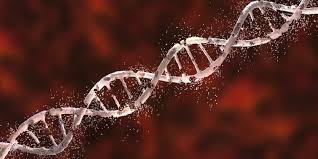
Key protein regulates DNA enzymes, promoting genome stability
Researchers made a major discovery by identifying the role of the protein USP50 in regulating enzyme activity during DNA replication, which is critical for genome stability. The publication in Nature Communications sheds light on how USP50 controls the coordination of replication enzymes, particularly helicases and nucleases. These enzymes are important for unwinding and cutting DNA strands, which is an essential step in correct DNA duplication.
Professor Jo Morris of the University of Birmingham conducted the study, which discovered that USP50 plays an important role in selecting the optimal enzymes for DNA replication. DNA replication is a complex process that requires precise coordination between nucleases, which cut DNA strands, and helicases, which unwind them. The protein ensures that these enzymes operate together to avoid replication mistakes. However, when cells lack USP50, they are unable to manage this process, which can lead to DNA replication errors and potentially genetic instability.
Professor Morris continues, "We discovered that because there are multiple enzymes involved in cleaving and unwinding, cells must manage which ones they employ to ensure effective reproduction. USP50 is essential to this regulation." In the absence of USP50, enzyme use is uncoordinated, resulting in replication mistakes that may contribute to genetic disorders such as early ageing and certain malignancies.
Implications of Hereditary Conditions
One of the most important findings of this study is the potential to increase our understanding of inherited disorders. When DNA replication fails, it raises the likelihood of genetic mutations, which can lead to disease. The significance of USP50 in guaranteeing exact replication opens up new possibilities for research into how genetic instability might lead to diseases like cancer.
Professor Simon Reed, Co-Director of Cardiff University's Division of Cancer and Genetics and study co-author, stated, "This research sheds light on the complex mechanisms that protect our cells from DNA damage and highlights how these discoveries could shape future therapies." The findings provide critical information for designing therapeutic strategies that safeguard the integrity of DNA, particularly for people at risk of genetic diseases.
Uncoordinated enzyme activity: cellular struggle
The absence of USP50 disturbs the delicate balance of enzyme activity, causing cells to use nucleases and helicases less effectively. This lack of coordination creates errors throughout the replication process, which can lead to damaged DNA strands or incomplete replication. The study found that cells attempt to use numerous helicases and nucleases at the same time, which frequently causes replication to slow or fail. By determining USP50's significance, the research team has solved a fundamental problem in understanding how cells maintain genomic stability throughout replication.
Future Therapeutic Applications.
The study's findings show promise for future treatment strategies. If scientists can modify or imitate the USP50's function, they may be able to minimize replication errors in cells, lowering the risk of genetic alterations. Because genetic instability is a known cause of illnesses such as cancer, this finding has important implications for the development of medicines that preserve DNA integrity.
The study, heralded as a milestone in genetic science, sets the path for more research into the precise molecular mechanisms of USP50 and its potential as a therapeutic target for genome integrity.